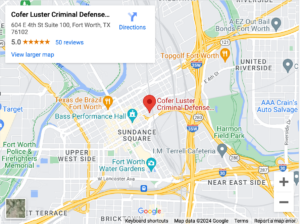
A felony charge in Fort Worth, Texas, can change your life forever. If you’re facing felony charges, you are likely concerned about what could happen if you are convicted.
We will explain what a felony is, what the possible consequences of a felony conviction are, and the process of undergoing a felony case. If you need help after being charged with a felony, you should consider hiring a Fort Worth criminal defense attorney.
Understanding Felony Classifications

A felony is the most serious type of crime in the Texas Penal Code. These charges are much more severe than misdemeanors. They often lead to prison time and can affect your rights for years to come. The Texas legal system categorizes felonies into five levels based on severity.
Each category carries specific penalties and consequences that reflect the seriousness of the offense:
- Capital felonies face the most severe penalties, including life in prison without parole or death. Examples include capital murder cases.
- First-degree felonies can result in 5 to 99 years in prison and fines up to $10,000. These include crimes like aggravated robbery and murder.
- Second-degree felonies carry sentences of 2 to 20 years and similar fines to first-degree felonies. Crimes in this category often include aggravated assault and sexual assault.
- Third-degree felonies can lead to 2 to 10 years of imprisonment. Common examples are intoxication assault or certain forms of possession of a firearm by a felon.
- State jail felonies represent the lowest felony level, with punishments ranging from 180 days to 2 years in state jail facilities, not prison.
Understanding these classifications is crucial for anyone facing felony charges, as the category of your charge directly impacts potential sentences and defense strategies.
Long-Term Consequences of a Felony Conviction
The consequences of a felony conviction extend far beyond prison time and fines. The Bureau of Justice Statistics reports that courts sentence over a million people for felonies each year. These consequences can significantly impact your future.
The range of limitations imposed by a felony conviction affects nearly every aspect of daily life including:
- Loss of voting rights during incarceration and sometimes beyond
- Restrictions on firearm ownership
- Difficulty finding employment
- Limited housing options
- Reduced educational opportunities
- Travel restrictions
- Loss of professional licenses
These restrictions often persist long after the sentence is completed, creating lasting challenges for both the individual and their family members.
Common Types of Felony Cases
The criminal justice system recognizes several major categories of felony offenses. Understanding these distinctions helps clarify the nature of specific charges.
Violent Felonies
Violent crimes represent some of the most seriously prosecuted felony cases in the system.
The prosecution typically pursues maximum penalties for these offenses:
- Murder
- Armed robbery
- Aggravated assault
- Kidnapping
These charges often involve complex defense strategies and extensive evidence review.
Drug-Related Felonies
The severity of drug-related felonies depends on multiple factors that courts consider during prosecution.
Key elements that influence charges include:
- Type of substance
- Amount possessed
- Intent to distribute
- Location of arrest
Understanding these factors helps determine potential defense approaches.
Property Crimes
Many property crimes rise to the felony level when they involve significant value or aggravating circumstances.
Common examples of felony property crimes include:
- Grand theft
- Burglary
- Arson
- Vehicle theft
The specific value thresholds for felony charges vary by jurisdiction and type of property.
White-Collar Felonies
Financial crimes often involve complex paper trails and extensive investigation.
These sophisticated offenses typically include:
- Fraud
- Embezzlement
- Money laundering
- Identity theft
Building a defense against these charges requires a detailed analysis of financial records and transaction histories.
The Felony Court Process
Understanding the legal process helps you prepare for what lies ahead. Each stage presents unique challenges and opportunities for your defense.
Initial Appearance And Booking
After arrest, law enforcement officers follow a standardized booking process.
This process includes several important steps:
- Photographing and fingerprinting
- Recording personal information
- Initial health screening
- Property inventory
- Temporary holding
These procedures establish the official record of your arrest and the initiation of criminal proceedings.
The Grand Jury Process
In Texas, felony cases generally require a grand jury indictment before proceeding to trial unless the defendant waives the indictment.
The grand jury plays a crucial role in determining whether a case should move forward by:
- Reviewing evidence presented by the prosecutor
- Hearing witness testimony, though usually only from those chosen by the prosecution
- Evaluating probable cause to decide if the case should proceed
- Issuing an indictment (“True Bill”) when at least 9 of the 12 jurors find sufficient evidence
- Declining prosecution (“No Bill”) if they determine the evidence is insufficient
This process does not determine guilt or innocence but serves as a preliminary review of the prosecution’s case. Grand jury proceedings are conducted in secrecy, and the defense typically does not participate unless the prosecutor allows the defendant to testify. In some cases, a defendant may waive the grand jury process and proceed with charges based on a prosecutor’s complaint, particularly in plea negotiations.
Pre-Trial Phase and Preparation
The pre-trial period involves numerous important activities that can significantly impact your case:
- Evidence discovery
- Motion filing
- Plea negotiations
- Trial preparation
Each of these elements requires careful attention and strategic planning.
How Cofer Luster Criminal Defense Lawyers Can Help After a Felony Charge
Felony charges carry serious legal and personal consequences, making it crucial to understand how they are classified, prosecuted, and defended – especially under Texas law. From violent offenses and drug-related crimes to white-collar and property felonies, each category comes with specific legal thresholds and penalties that impact sentencing and defense strategies.
At Cofer Luster Criminal Defense Lawyers, we’ve spent decades defending clients in criminal cases. Let us put our experience to work for you.
When you hire us, we will:
- Construct a strong defense by collecting evidence and investigating your case.
- Collaborate with top forensic specialists to dispute the evidence presented against you
- Develop a defense strategy that gives you the best chance of an acquittal
- Analyze your legal options and explain our basis for accepting a plea deal or going to court
- Zealously represent you during each phase of your criminal case
For anyone facing a felony accusation, knowing the legal framework is essential to navigating the criminal justice system effectively. Contact us today at (682) 777-3336 for a free case evaluation.

